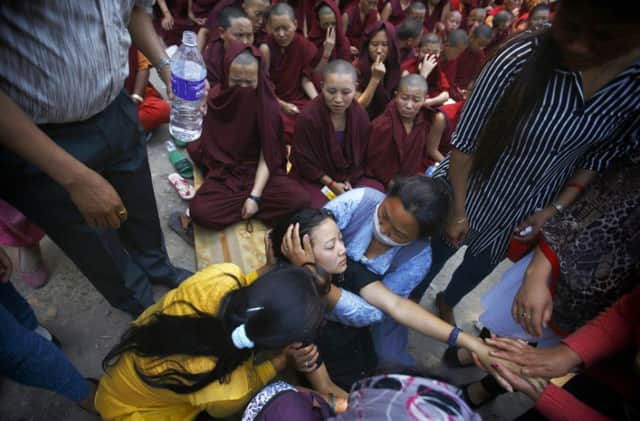Sherpas threaten boycott of Everest climbs


Several have already quit following Friday’s avalanche, said Ang Tshering of the Nepal Mountaineering Association. Sherpas are unhappy about the level of compensation offered to families of the deceased.
Foreign mountaineers have long relied on the native Nepalese climbers for everything from hauling gear to cooking to guiding. Without the guides, it would be nearly impossible for expedition teams to continue.
Advertisement
Hide AdAdvertisement
Hide AdThe news came as Buddhist monks yesterday cremated the remains of guides recovered after being buried in the deadliest avalanche to hit Everest. At least 13 were killed when a block of ice tore loose from the mountain. Three sherpas missing in the incident are presumed dead.
“I can’t even think of going back to the mountain,” said Tashi Dorje, whose cousin was killed. “We have not just lost our family members, but it is a loss for the whole mountaineering community and the country.”
Hundreds of people lined the streets of Nepal’s capital, Katmandu, yesterday as the bodies of six of the victims were driven through the city in open trucks.
During the cremation ceremony, dozens of nuns chanted for the victims’ souls to be released as the bodies were covered in pine branches.
While the work on Everest is dangerous, it has also become sought-after. A top high-altitude guide can earn the equivalent of £3,500 in a three-month climbing season, nearly ten times Nepal’s £420 average annual salary.
The avalanche came just as the climbing season was about to begin in earnest, with mountaineers set to begin moving above base camp and slowly acclimatising to the altitude on the world’s highest mountain. Most attempts to reach the summit occur in mid-May, when weather is at its most favourable.
Mr Tshering said there were about 400 foreign climbers from 39 expedition teams on the mountain and an equal number of sherpas, along with many more support staff – cooks, cleaners and porters – at base camp.
Since the avalanche, sherpas have expressed anger at the response from Nepal’s government, which profits from the permit fees charged to the climbing expeditions – at least $10,000 (£5,900) per person. The government has announced an emergency aid of about £250 for the families of the deceased climbers, but the Sherpas are demanding better treatment.
Advertisement
Hide AdAdvertisement
Hide AdIn a blog post, mountaineer Tim Rippel said “emotions are running wild and demands are being made to the government to share the wealth [from climbing] with the sherpa people”.
Mr Rippel, a Himalayan guide and owner of Canada-based guiding company Peak Freaks, said many Sherpas were frustrated by their tiny share of the money that flows into Nepal as a result of the climbing industry.
Yesterday, deputy prime minister Prakash Man Singh said: “We will do what we can, keeping with the standard practice to provide compensation.”